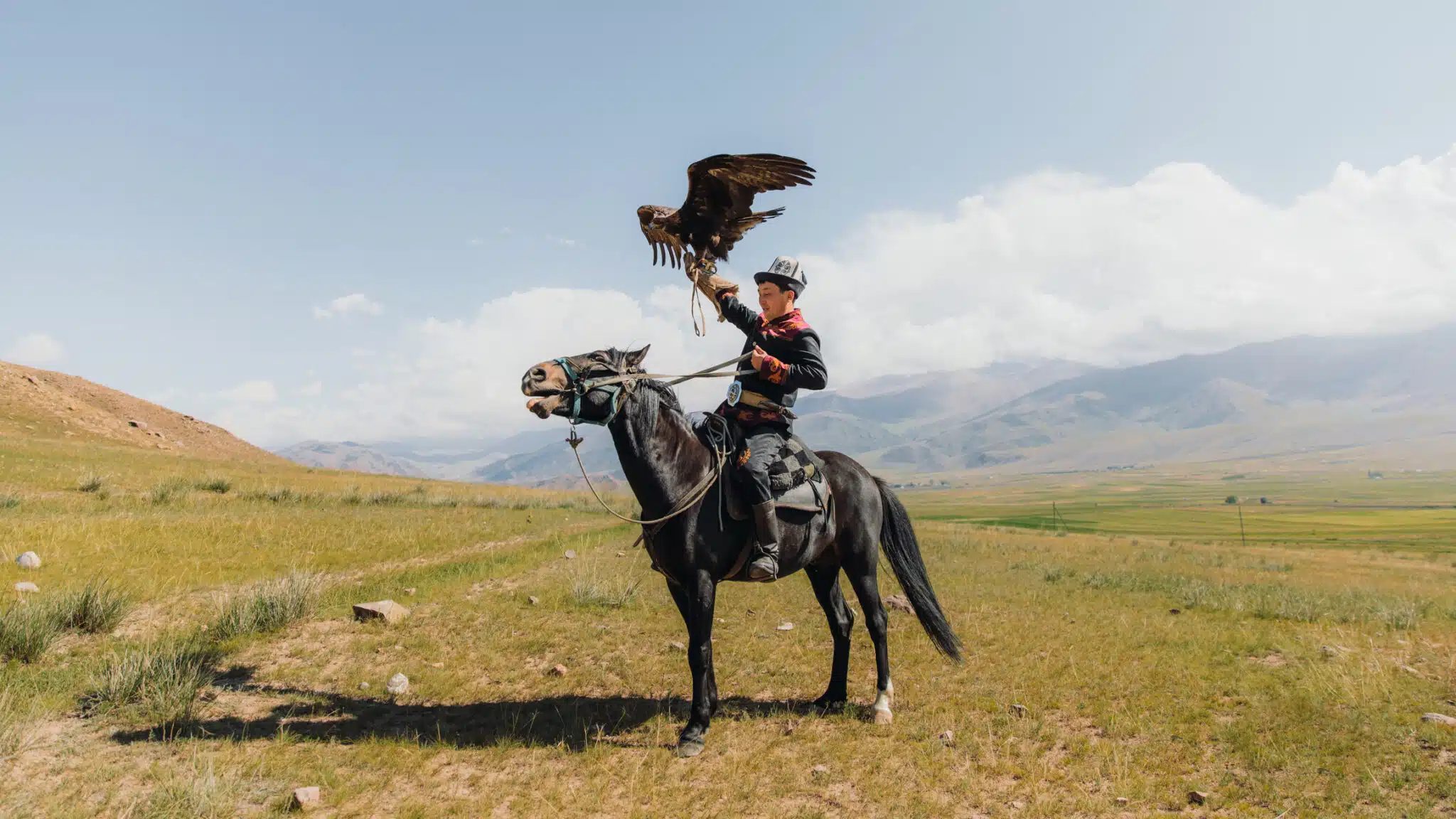The Talking Phrasebook Series presents useful phrases and words in side-by-side translation and with audio files specifically geared to help students work on listening skills and pronunciation. Below, you will find several useful phrases and words. To the left is the English and to the above right is an English transliteration of the Kyrgyz translation. Below the English transliteration is the original Kyrgyz Cyrillic.
In the center column for each row is a play button. The recorded file will feature first English, then the Kyrgyz in three versions: one slow, one with each syllable broken out, and a last version that will be spoken as it might be overheard in a conversation between native speakers. In “Counting,” the audio files have been grouped into three sets.
Briefly About Kyrgyz
 Kyrgyz is a Turkic language of the Kipchak branch. It is related to Turkic and most other languages of Central Asia.
Kyrgyz is a Turkic language of the Kipchak branch. It is related to Turkic and most other languages of Central Asia.
Kyrgyz is one of two official languages in Kyrgyzstan, along with Russian. Both official languages are written in Cyrillic script. Kyrgyz in Kyrgyzstan is spoken in dialects, with Northern and Southern being the two major divisions. “Standard Kyrgyz” is based on the Northern dialect.
Kyrgyz is spoken by about 7.3 million people worldwide. There are significant immigrant populations of Kyrgyz abroad, where they often live and work in order to send money back to Kyrgyzstan to support their families. As of 2018, there were about 640,000 Kyrgyz in Russia – equal to about a tenth of the population of Kyrgyzstan itself. There were also major populations in Kazakhstan (35,000), Turkey (30,000), and the US (15,000).
Kyrgyz is closely related to Kazakh, the language of Kyrgyzstan’s larger, richer neighbor. It is also closely related to Altai, spoken in the Altai republic in southern Russia. All three languages share a high degree of mutual intelligibility.
Pamiri Kyrgyz is a dialect spoken in Afghanistan and there are also Kyrgyz-speaking populations native to western China and eastern Tajikistan. The wide geographic spread of the language is a testament of the traditionally nomadic nature of the Kyrgyz people and Central Asian cultures in general.
Facts About Krygyz Grammar
Kyrgyz has no grammatical gender. The Kyrgyz pronoun “ал” can mean “he,” “she,” or “it.”

Kyrgyz uses six grammatical cases: nominative, accusative, genitive, dative, locative, and ablative. These cases affect the endings of nouns, pronouns, and adjectives.
Kyrgyz is an agglutinative language, which means that grammatical information is primarily conveyed through the addition of suffixes to root words. These suffixes represent various grammatical features, such as tense, mood, aspect, and case.
Kyrgyz uses honorifics, as are common in many Turkic and Asian languages. These do have gender. Generally, any woman older than you will be “eje.” Men older than you will be “baike.” Teachers are generally referred to as “agai.” These can be used on their own, or, if you know the person’s name, as a suffix attached to the name. This system is also embedded in verb forms and pronoun usage.
Kyrgyz typically follows an SOV word order, which means that the subject comes first, followed by the object, and then the verb. This is in contrast to English, which follows a Subject-Verb-Object (SVO) word order.
Kyrgyz uses postpositions, rather than prepositions like in English. Postpositions are attached to the noun phrases and indicate relationships such as location, direction, and possession.
Kyrgyz Special Characters
Kyrgyz uses three letters in its Cyrillic alphabet that are not found in Russian:
Ң: It’s a nasal sound made at the back of the mouth, like you’re humming with your tongue pulled back, like the “ng” in “sing” or “long.”
Ү: Say “ee” (as in “see”) and round your lips like you’re saying “oo” – the tongue stays forward like in “ee”.
Ө: Say “eh” (like in “bed”) but round your lips.
Survival Basics for Kyrgyz
| Hello! | Salamatsyzby! (Саламатсызбы!) |
|
| Yes | Ooba (Ооба) |
|
| No | Jok (Жок) |
|
| Good morning! | Kutmanduu tangyngyz menen! (Кутмандуу таңыңыз менен!) |
|
| Good evening! | Kutmanduu kechingiz menen! (Кутмандуу кечиңиз менен!) |
|
| What’s up? | Emne jangylyk? (Эмне жаңылык?) |
|
| What’s up? | Emne boldu? (Эмне болду?) |
|
| How are you? | Kandaysiz? (Кандайсыз?) |
|
| Good, thanks, and you? | Jakshy, rahmat, ozunguz? (Жакшы, рахмат, өзүңүз?) |
|
| Good bye! | Kosh kalyng! (Кош калың!) |
|
| See you later! | Korushkoncho! (Корушкончо!) |
|
| Sorry! | Kechirip koyunguz! (Кечирип коюңуз!) |
|
| Open/closed | Achyk/jabyk (Ачык/жабык) |
|
| Pull/push | Tart/turt (Тарт/түрт) |
|
| Small/big | Kichine/chong (Кичине/чоң) |
|
| Do you speak English? | Siz Anglische suyloy alasyzby? (Сиз англисче сүйлөй аласызбы?) |
|
| I don’t speak English. | Men Anglische suyloy albaym. (Мен англисче суйлой албайм.) |
|
| I only speak a little Kyrgyz. | Men bir az Kyrgyzscha suyloy alam. (Мен бир аз Кыргызсча суйлой алам.Мен бир аз кыргызча сүйлөй алам.) |
|
| I understand. | Men tushundom. (Мен түшүндүм.) |
|
| I don’t understand. | Men tushunboym. (Мен түшүнбөйм.) |
|
| Thank you! | Rahmat! (Рахмат!) |
|
| Thank you very much! | Chong rahmat! (Чоң рахмат!) |
|
| Very well, thanks! | Oto jakshy, rahmat! (Өтө жакшы, рахмат!) |
|
| Good | Jakshy (Жакшы) |
|
| Please | Suranych (Сураныч) |
|
| You’re welcome! | Echteke emes! (Эчтеке эмес) |
|
| Excuse me! | Kechiresiz! (Кечиресиз!) |
|
| A little | Bir az (Бир аз) |
|
| Could you speak more slowly? | Bir az jayiraak suylonguzchu! (Бир аз жайыраак суйлонузчу!) |
|
| Could you write that down? | Jazyp beresizbi? (Жазып бересизби?) |
|
| My bag/wallet/passport was stolen | Men sumkamdy/kapchigimdi/pasportumdu uurdatip jiberdim (Мен сумкамды/капчыгымды/паспортумду уурдатып жибердим) |
|
| I need a doctor! | Maga dogdurdu chakyrgyla! (Мага догдурду чакыргыла!) |
|
| Call the police! | Militsiyaga konguro kylyngyzchy! (Милицияга чалыңызчы!) |
Introductions in Kyrgyz
Asking Directions
Shopping
| How much does that cost? | Tetigi kancha turat? Тээтиги канча турат? |
|
| The menu, please! | Menunu berip koyunguzchu! Менюну берип коюңузчу? |
|
| I’d like a beer, please | Maga syra alyp kelingizchi! Мага сыра алып келиңизчи? |
|
| I would like to pay. | Men tologonu jatam. Мен төлөгөнү жатам. |
|
| Do you accept credit cards? | Kredit kartochka menen tolosom bolobu? Кредит карточка менен төлөсөм болобу? |
Counting
| 0 | nol’ ноль |
|
| 1 | bir бир |
|
| 2 | eki эки |
|
| 3 | uch үч |
|
| 4 | tort төрт |
|
| 5 | besh беш |
|
| 6 | alty алты |
|
| 7 | jeti жети |
|
| 8 | segiz сегиз |
|
| 9 | toguz тогуз |
|
| 10 | (Count 1-10) | on он |
| 11 | on bir он бир |
|
| 12 | on eki он эки |
|
| 13 | on uch он үч |
|
| 14 | on tort он төрт |
|
| 15 | on besh он беш |
|
| 16 | on alty он алты |
|
| 17 | on jeti он жети |
|
| 18 | on segiz он сегиз |
|
| 19 | (Count 11-19) | on toguz он тогуз |
| 20 | jiyirma жыйырма |
|
| 21 | zhyiyrma bir жыйырма бир |
|
| 22 | zhyiyrma eki жыйырма эки |
|
| 30 | otuz отуз |
|
| 40 | kyrk кырк |
|
| 50 | eluu элүү |
|
| 60 | altymysh алтымыш |
|
| 70 | jetimish жетимиш |
|
| 80 | seksen сексен |
|
| 90 | tokson токсон |
|
| 100 | juz жүз |
|
| 111 | juz on bir жүз он бир |
|
| 125 | juz zhyiyrma besh жүз жыйырма беш |
|
| 200 | (Count 20-200) | eki juz эки жүз |
More About the Kyrgyz
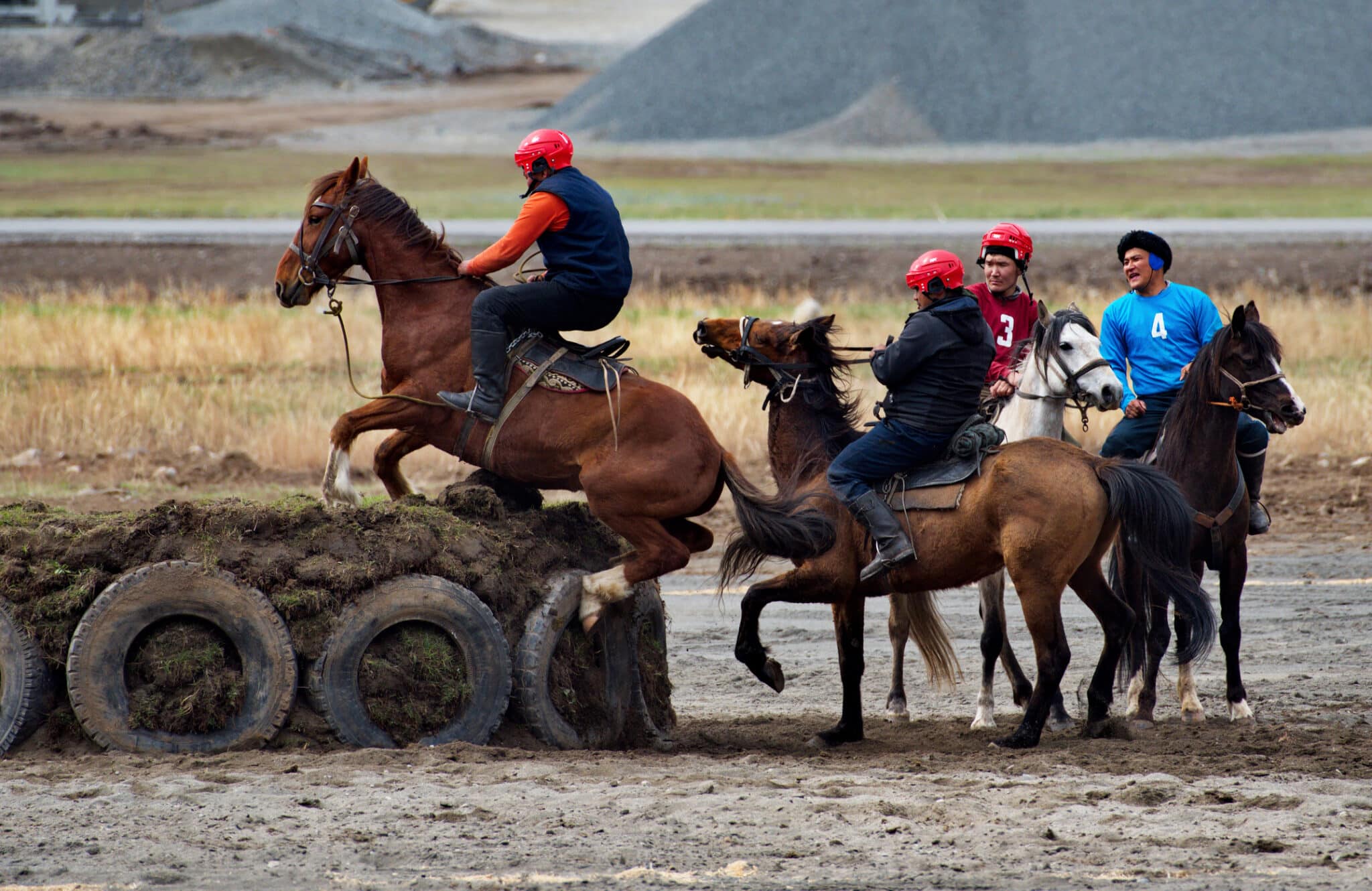
Kok Boru: On Spectating and Playing a Dangerous Traditional Sport
As soon as I arrived in Bishkek, I started asking every person I met where I could find, watch, and play kok boru. I first learned about the sport in researching Kygyzstan before I arrived in Bishkek and was instantly fascinated by it. Kok boru is the wild national sport of Kyrgyzstan. It’s basically polo, […]
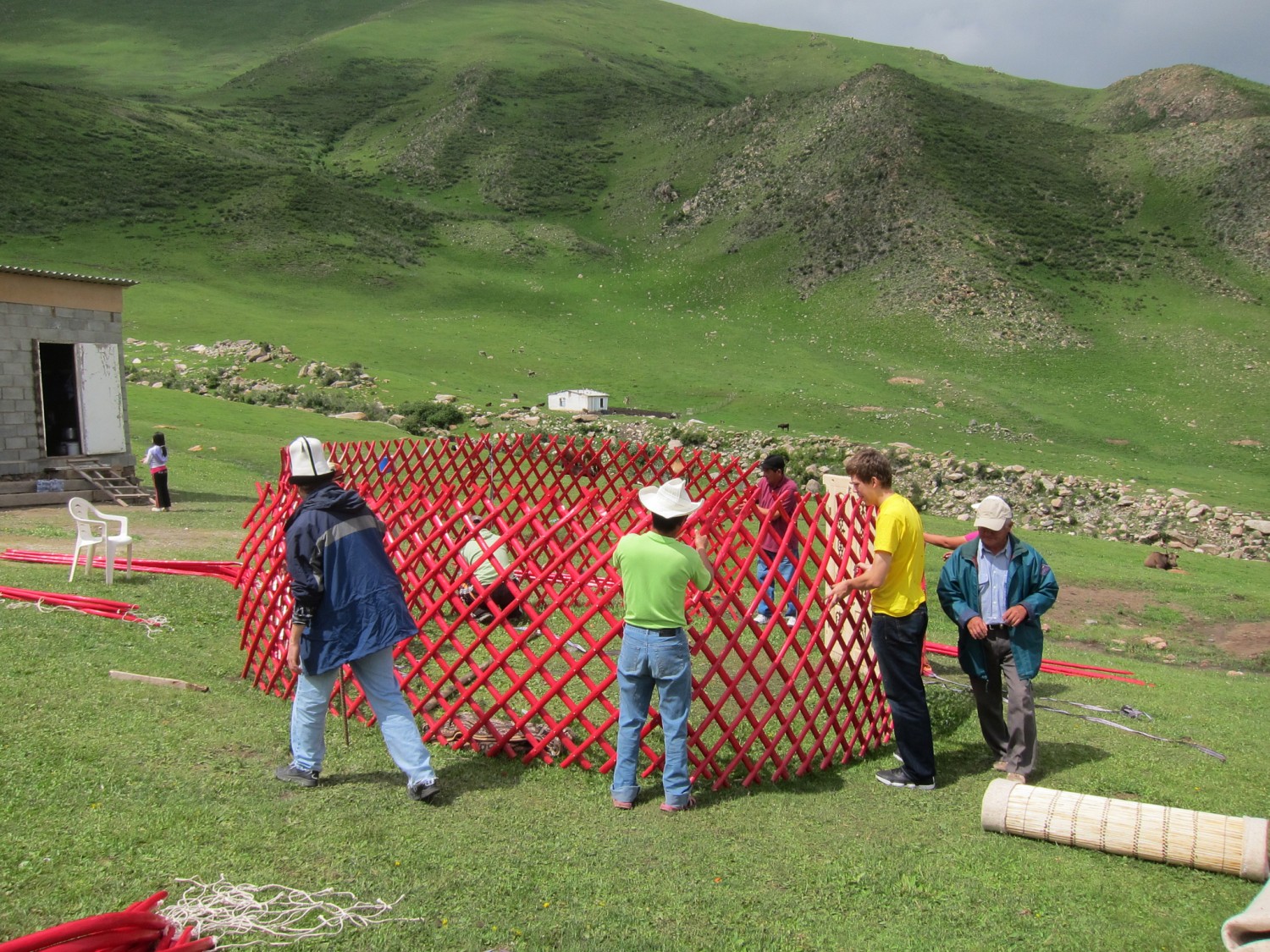
Home Sweet Yurt
Yurts are felt-covered, portable housing that have long been used throughout Central Asia. Although the region is urbanizing, the Kyrgyz still know and follow the traditional customs that surround the traditional yurt. Hospitality is revered in the traditionally poor country of Kyrgyzstan. As soon as they see a new arrival, neighbors will come to meet […]
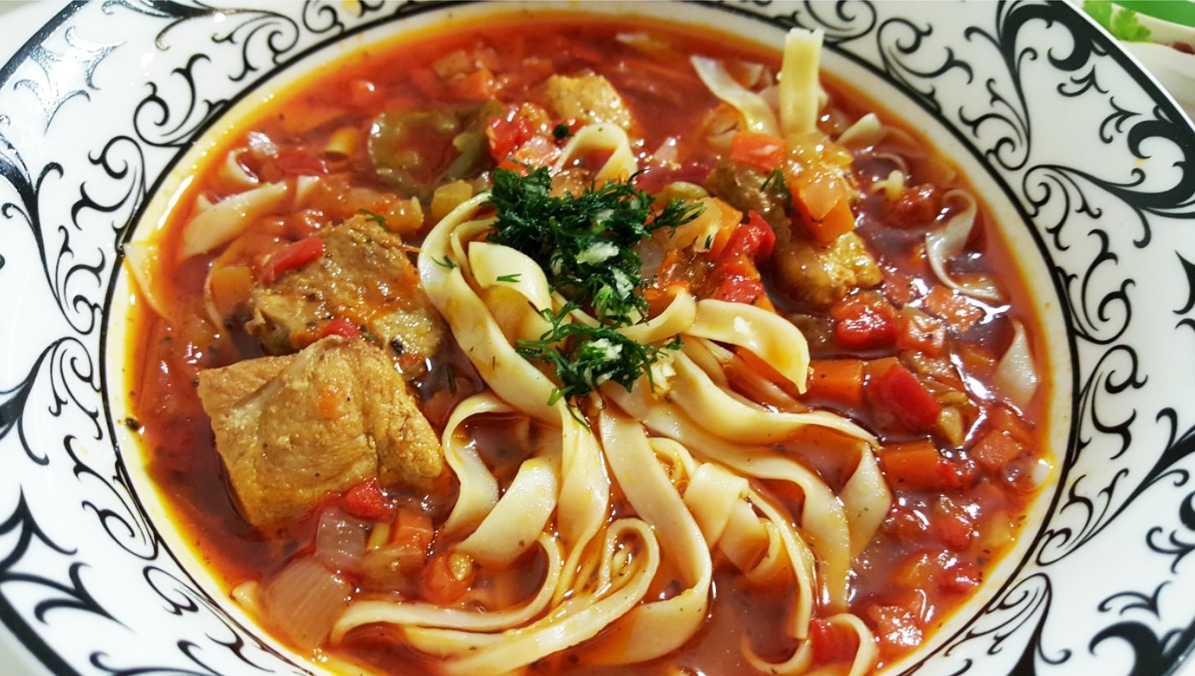
Lagman: The Noodles of the Silk Road
Lagman is a dish that is very common in Central Asia, China, and many Middle Eastern countries. It can also be found in Russia and the Caucasus and is a popular dish among the Crimean Tatars. The basic recipe, which combines noodles with meat, has hundreds of variations. In Uzbekistan, the dish tends be a […]

Sheep Guts Won’t Kill You: A Guide to Seeing the Kyrgyzstan that Most People Don’t
The Kyrgyz are a Turkic people with a rich identity that revolves around their nomadic heritage. Although they were forcibly settled by the Soviets, some have maintained or returned to nomadic traditions. Other strong elements of their culture include faith in Islam that is heavily informed by previous (or present) belief in Tengrism, Zoroastrianism, and […]
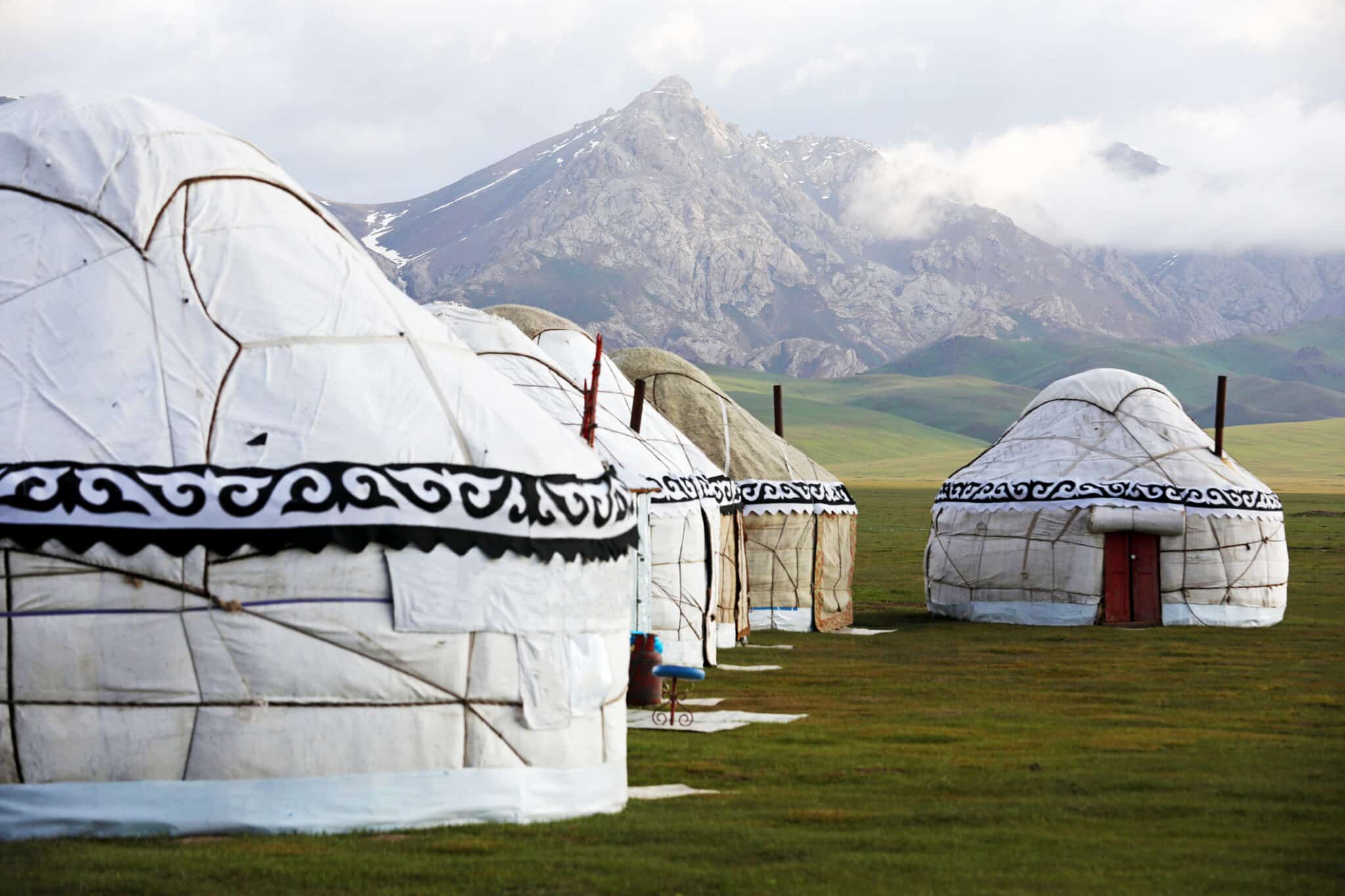
Dwellings in Traditional Funeral and Burial Rituals of the Kyrgyz People (Using Yurts as an Example)
Using historical and ethnographic studies from previous years, literary data, and his own field research conducted over several years’ time in different regions of Kyrgyzstan, the author explores the place and role of dwellings in traditional funeral and burial rituals of the Kyrgyz people. The yurt, a type of dwelling continually used by the formerly […]
More Phrasebooks
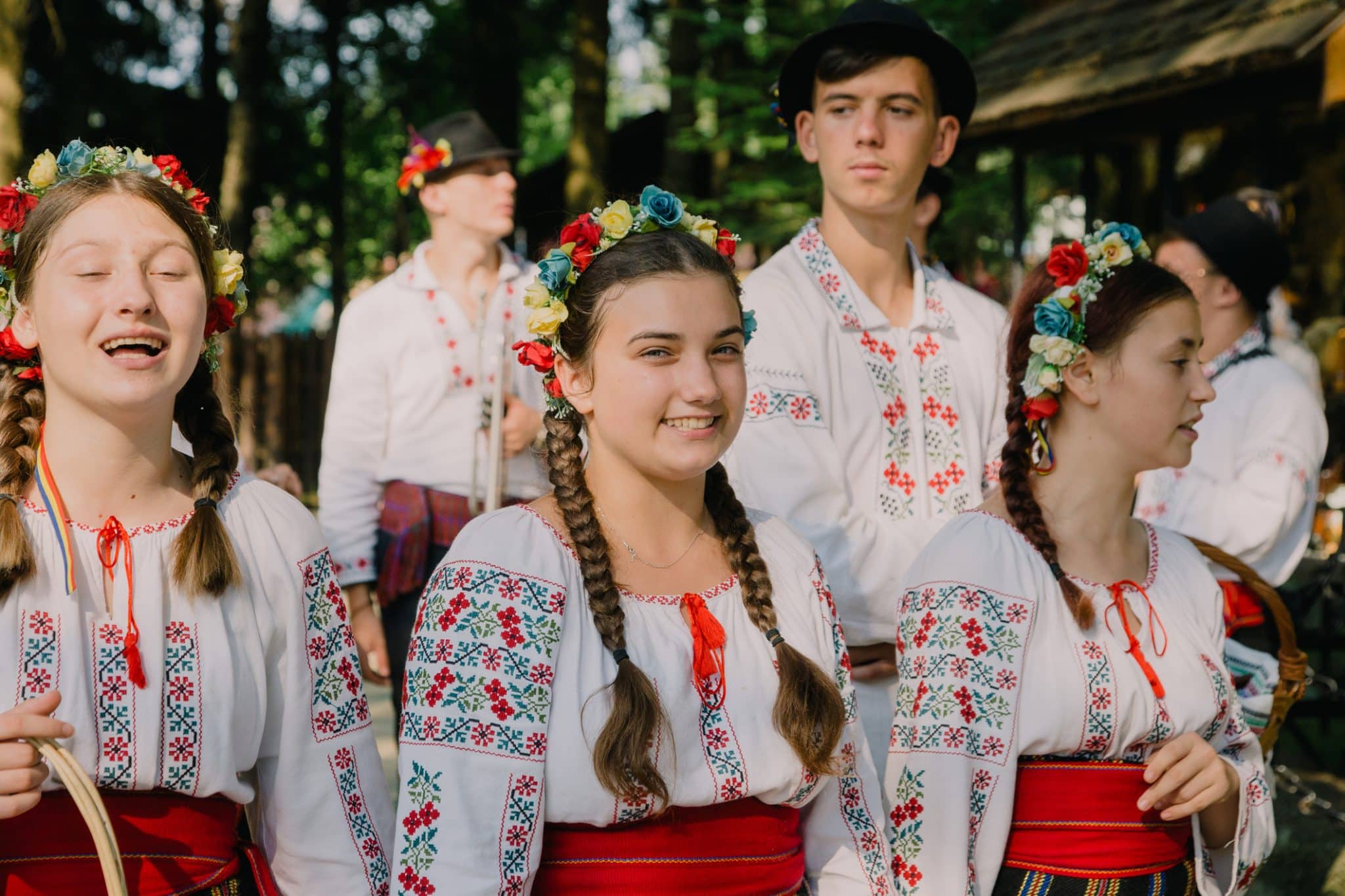
The Talking Romanian (in Moldova) Phrasebook
The Talking Phrasebook Series presents useful phrases and words in side-by-side translation and with audio files specifically geared to help students work on listening skills and pronunciation. Below, you will find several useful phrases and words. To the left is the English and to the far right is the Romanian translation. In the center column […]

The Talking Turkish Phrasebook
The Talking Phrasebook Series presents useful phrases and words in side-by-side translation and with audio files specifically geared to help students work on listening skills and pronunciation. Below, you will find several useful phrases and words. To the left is the English and to the far right is the Turkish translation. In the center column for […]

The Talking Estonian Phrasebook
The Talking Phrasebook Series presents useful phrases and words in side-by-side translation and with audio files specifically geared to help students work on listening skills and pronunciation. Below, you will find several useful phrases and words. To the left is the English and to the far right is the Estonian translation. In the center column […]

